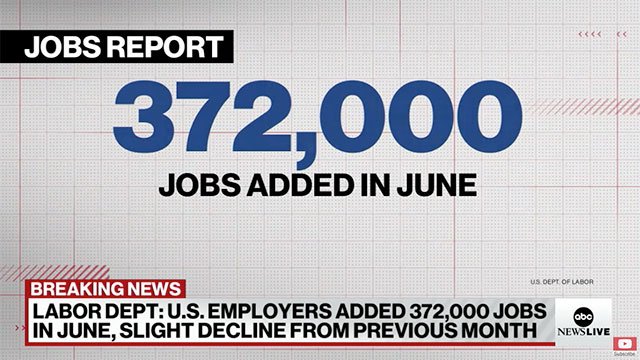Hollywood At A Standstill: The Actors' And Writers' Strike Explained

Table of Contents
The Core Issues Fueling the Strike
The current actors' and writers' strike is not about simple salary demands; it's about a fundamental shift in the entertainment industry landscape. The rise of streaming services has dramatically altered the traditional business model, leaving many actors and writers feeling undervalued and insecure.
Fair Compensation in the Streaming Era
Traditional compensation models, built around residuals from television reruns and box office revenue, are failing in the streaming era. Streaming platforms offer subscription-based models, making revenue streams less transparent and often resulting in significantly reduced payments for creative professionals.
- Low residuals from streaming platforms: Unlike network television, streaming services often pay minimal or no residuals to actors and writers for subsequent streams and broadcasts of their work. This is a major point of contention fueling the actors' and writers' strike.
- Lack of transparency in streaming revenue: The opaque nature of streaming revenue makes it difficult for actors and writers to understand how their work is contributing to a platform's overall success. This lack of transparency is a key driver behind the current negotiations.
- Concerns about AI replacing human creative roles: The increasing use of artificial intelligence in scriptwriting and performance capture raises concerns about job security and the potential devaluation of human creative talent. The unions are seeking protections against the unauthorized use of their likenesses and work through AI.
Working Conditions and Job Security
Beyond compensation, the strike highlights the demanding working conditions and lack of job security prevalent in the industry. The rise of streaming has led to a surge in content production, but not necessarily in stable, well-compensated employment for writers and actors.
- Long working hours: Actors and writers often work excessively long hours to meet tight deadlines, impacting their well-being and personal lives. The current strike aims to address these grueling working conditions.
- Unrealistic deadlines: The pressure to produce vast quantities of content quickly has led to unrealistic deadlines and a pervasive sense of burnout amongst creative professionals.
- Lack of healthcare benefits for many: Many actors and writers struggle to access affordable healthcare, a significant concern amplified by the precarious nature of freelance work. The unions are advocating for improved healthcare provisions in their negotiations.
- Fear of being replaced by AI: The increasing use of AI in the entertainment industry is causing anxieties amongst actors and writers about job displacement and the erosion of their skills.
The Impact of the Strike on Hollywood
The actors' and writers' strike has already had a significant impact on the entertainment industry, causing widespread disruption and financial losses.
Production Delays and Cancellations
The strike has brought nearly all film and television production to a standstill in Hollywood. Major projects have been delayed, and some have been cancelled entirely.
- Delayed release dates for movies and TV shows: Many highly anticipated films and television series have already experienced delays in their release dates due to the ongoing strike.
- Cancelled projects: Some studios have preemptively cancelled projects, acknowledging that the prolonged strike makes them financially unviable.
- Loss of revenue for studios and related industries: The halt in production has resulted in significant financial losses for studios, production companies, and related businesses such as catering, location services, and transportation. This economic ripple effect is far-reaching.
Ripple Effects Across the Entertainment Industry
The impact of the strike extends far beyond Hollywood studios. Related industries are also feeling the pinch.
- Post-production delays: Post-production houses are experiencing delays as projects remain unfinished due to the lack of access to actors' voices for dubbing or reshoots.
- Marketing campaigns on hold: Marketing campaigns for upcoming films and shows have been put on hold due to the uncertainty surrounding release dates.
- Impact on tourism in filming locations: Many communities rely on the economic activity generated by film productions. The strike is impacting these local economies significantly.
- Potential job losses across related sectors: The prolonged strike is potentially leading to job losses across various related sectors such as catering, transportation and other support services within the industry.
Potential Outcomes and Resolutions
The resolution to the actors' and writers' strike remains uncertain, with ongoing negotiations between the unions (SAG-AFTRA and WGA) and the Alliance of Motion Picture and Television Producers (AMPTP).
Negotiations and Potential Compromises
The unions' key demands include fair compensation models for streaming, improved working conditions, and safeguards against the misuse of AI. The AMPTP has made some counter-offers, but a significant gap remains.
- Key demands from the unions: These include increased residuals for streaming, greater transparency in revenue sharing, stronger protections for actors against AI, and improved working conditions.
- Potential concessions from the AMPTP: The AMPTP has offered some concessions, but they haven't yet addressed the core concerns of the unions regarding fair compensation and the use of AI.
- Possible scenarios for a resolution: The strike could end with a negotiated settlement, a prolonged stalemate, or even a series of smaller, individual agreements.
Long-Term Implications for the Entertainment Industry
Regardless of the immediate outcome, the actors' and writers' strike will likely have long-term implications for the entertainment industry.
- Potential changes in compensation models: The strike may lead to fundamental changes in how actors and writers are compensated in the streaming era, potentially including new revenue-sharing models.
- New regulations for AI usage: The strike has brought the ethical and legal implications of AI in the creative industries into sharp focus, leading to potential new regulations.
- Long-term impact on the creative landscape: The strike could reshape the relationship between creative professionals and studios, potentially fostering a more collaborative and equitable environment.
Conclusion
The actors' and writers' strike represents a critical moment in the history of Hollywood. The core issues of fair compensation, working conditions, and the impact of new technologies are at stake. The outcome of these negotiations will significantly shape the future of the entertainment industry and how creative professionals are valued. Staying informed about the developments in the actors' and writers' strike is crucial for understanding the evolving landscape of Hollywood and the broader entertainment ecosystem. Understanding the complexities of this ongoing actors' and writers' strike is vital for anyone interested in the future of entertainment. Keep following updates on the actors' and writers' strike to stay informed.

Featured Posts
-
 Missed Millions Turki Al Sheikh And The Lost Potential Of The Canelo Paul Event
May 05, 2025
Missed Millions Turki Al Sheikh And The Lost Potential Of The Canelo Paul Event
May 05, 2025 -
 45 000 Worth Of Literary History Rare Novel Found In Bookstore
May 05, 2025
45 000 Worth Of Literary History Rare Novel Found In Bookstore
May 05, 2025 -
 Vitoria Apertada Corinthians Supera Santos Com Atuacao Discreta De Neymar 2x1
May 05, 2025
Vitoria Apertada Corinthians Supera Santos Com Atuacao Discreta De Neymar 2x1
May 05, 2025 -
 Georgetown Celebrates Local Woman Wins Kentucky Derby Festival Queen Title
May 05, 2025
Georgetown Celebrates Local Woman Wins Kentucky Derby Festival Queen Title
May 05, 2025 -
 U S Jobs Report 177 000 Jobs Added In April Unemployment Remains At 4 2
May 05, 2025
U S Jobs Report 177 000 Jobs Added In April Unemployment Remains At 4 2
May 05, 2025
